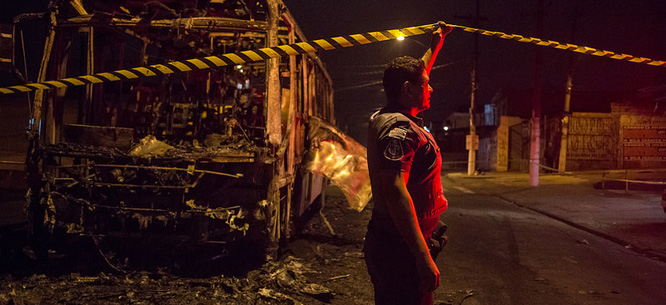A World Cup Win for Brazil?
A World Cup Win for Brazil?

FIFA thought Brazil was an easy mark, but has learned what every three-card monte dealer knows: when the law comes around, you better fold up your table and beat it, or you might find yourself in real trouble.
Police in Rio de Janeiro have arrested Ray Whelan, one of the directors of the sports tourism firm Match Hospitality, under suspicion of scalping World Cup tickets. Match holds the exclusive contract with FIFA for the sale of luxury World Cup packets through 2023, and has been linked to FIFA since 1986.
Whelan’s arrest may not be the most exciting play in the World Cup, but it is the most hopeful. After decades of dubious practices, FIFA is finally being pressed for answers, not only by journalists but by investigative police.
Caveats and disclaimers: Whelan is not a direct FIFA employee and as of now he stands accused, not convicted. Some may write off the charges, moreover, on the grounds that ticket-scalping is a victimless crime: scalpers take financial and legal risks, and willing consumers (in some cases, at least) get what they pay for. But it is a crime nevertheless—reselling World Cup tickets for a profit violates both FIFA rules and Brazilian law—and a lucrative one at that: police claim that the ring surrounding Whelan netted some $100 million in resales. Operating through Match, which in turn seems to be operating through scalpers, enables FIFA to skirt its own rules, selling blocks of tickets to international corporations while individual, local fans are locked out.
Fans watching on TV have been wondering why we are seeing so many empty seats at supposedly sold-out games. FIFA blamed the empty seats on individual no-shows, but why would thousands of individual consumers buy exorbitantly priced tickets and not bother to show up? Now the picture becomes a little clearer: it seems likely that many of those seats were purchased as part of multi-game block packages from scalpers. Whelan’s arrest suggests that this scheme was operating under FIFA’s nose and perhaps with its connivance.
However the investigation proceeds, the charges certainly look bad for FIFA. Phillippe Blatter, nephew of FIFA President Sepp Blatter, is a minority stakeholder in Match, and Whelan was operating out of FIFA’s Brazil headquarters, in Rio’s famed Copacabana Palace Hotel. His arrest there on July 8 offered an “I told you so” moment to the Brazilian protesters who have been denouncing FIFA corruption since last year.
Nor is the story likely to stop with Whelan. Eleven lower-level collaborators, including Lamine Fofana, a French-Algerian ticket broker who has spent years cultivating contacts within FIFA and among international footballers, were also arrested. Fofana seems to have been the middleman connecting Whelan and Match to a network of shady Brazilian travel agencies, who then sold the packets to corporate customers. FIFA had supposedly set up a rigorously controlled ticket-vending operation to prevent scalping, making it difficult for buyers to purchase more than a few tickets at a time. But police have allegedly recorded Fofana stating that he held fifty tickets for the final game in his hand, ready for sale to willing bidders. Police have indicated their strong suspicion that Whelan could not have organized the scheme without direct collaboration within FIFA itself, and have pledged to continue the investigation.
Ticket scalping is nearly as old as the game itself, and FIFA’s willingness to sell itself to the highest bidder is hardly news, as the widely derided decision to host the 2022 World Cup in Qatar suggests. Brazil—which has consistently earned failing grades from Transparency International on a wide variety of corruption indices—probably seemed like a hospitable environment for such operations. But what Whelan and his allies may have overlooked is that investigative policing and prosecution have made great progress in Brazil of late. Rio’s Federal Police—the closest analog to the FBI in Brazil—has made great strides towards transparency and efficiency, despite notable internal conflicts.
Rio’s Civil Police, which made the Whelan arrest, has been less consistent but has also shown diligence and initiative in certain investigations. FIFA—the object of great popular animosity in Brazil—may have presented a target too tempting to overlook. Most notable is that FIFA’s Brazilian allies, particularly within the nation’s own murky national football confederation, have been either unable or unwilling to intimidate the Civil Police into letting go of this bone.
The Brazilian team lost its semifinal against Germany in disgraceful fashion. Brazilian fans have a long football memory, and this defeat will sting for generations. But after watching Brazil struggle through early rounds, Germany’s win came as no surprise. Off the field, meanwhile, Brazil has scored the biggest goal of the Cup—against FIFA itself. For football fans, that is reason enough to celebrate.
Bryan McCann is an associate professor of Latin American history at Georgetown University. He is the author of Hard Times in the Marvelous City: From Dictatorship to Democracy in the Favelas of Rio de Janeiro, recently published by Duke University Press.




